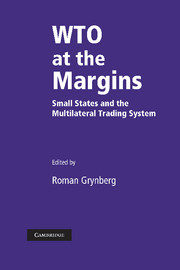Introduction
Published online by Cambridge University Press: 05 May 2010
Summary
This book aims not only to document almost ten years' experience of small vulnerable states with the WTO but also to explain why the experiences have occurred. Since the formation of the WTO in 1995, small states have become increasingly vocal in their criticism of what they see as onerous rules from which they feel that they have not benefited. Now at this pivotal point in the history of the WTO when development issues are at the heart of negotiations, how the larger and more powerful WTO members address the legitimate trade concerns of its poorest and most vulnerable members will shape the perception of the institution throughout much of the century. If the Doha Development Agenda fails to address these concerns in a constructive manner that recognises the particular vulnerabilities of various groups, it will leave the WTO further weakened and undermined from the perspective of a group of countries that are emerging as the majority of its members.
Small vulnerable states and, in particular, small island states have endowed or inherent handicaps that have shaped their trade and economic development as well as the policy of the international community since the colonial era. The combination of smallness, isolation and dispersion of small pockets of population has shaped the range and type of products and services that these countries have been able to export. What the export activities of small vulnerable states have in common is that a surplus or quasi-rent has been needed to cover the inherent cost disadvantage faced by the private investor who has chosen to locate in small vulnerable states.
- Type
- Chapter
- Information
- WTO at the MarginsSmall States and the Multilateral Trading System, pp. 1 - 8Publisher: Cambridge University PressPrint publication year: 2006



